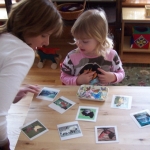 Childhood Communication
Childhood Communication
A series of articles written exclusively for OVL by Jacqui Wright
Independent Speech and Language therapist, Jacqui Wright, has over 22 years experience in South Africa, the U.S.A. and the UK. She is author of ‘Cracking the Literacy Puzzle’, RCSLT Bulletin, March 2006. Here, Jacqui from Childhood Communication Consultancy, based in Carlton, discusses Language development, and Play.
Childhood Communication Consultancy (CCC) specialises in assessing and treating children ages 0-19 years old with speech, language, listening, literacy, learning and social communication difficulties. Language development is assessed in line with a child’s general development i.e. motor skills (sitting, crawling, walking); cognitive skills (e.g. awareness of an object still existing when it is hidden); feeding and speech development (eating and drinking; babbling and first words). Development of language can be affected by these other aspects of general development; language is a unique and higher function that human beings use to share thoughts, ideas and feelings. Language itself is made up of a common set of rules that allows its users to communicate and exchange information. It increases in complexity from simple symbolism i.e. the word ‘ball’ symbolises a real object – a ball, to a complex Shakespearian soliloquy. Speech is the most common form of expressing language but it can be done in other ways: signing, pictures/writing, eye blinks etc. Each language in the world has its own set of rules for phonology (phonemes or speech sounds), morphology (word formation i.e. –ed = past tense), syntax (sentence formation), semantics (word and sentence meaning), prosody (intonation and rhythm of speech), and pragmatics (effective use of language). The most intensive period of language development is in the first 4 years of life when basic language foundations are laid as the brain is developing and maturing. More complex language structures are learned up to 7 years. Subsequently, language is further developed and linked to literacy skills. A world rich with language, play and exploring sights and sounds is best for language development in the early years.
Language Development & Play
0-6 months: The newborn recognises important sounds in his/her environment i.e. the parents’ voices. He/she learns that certain cries bring specific responses i.e. cry: discomfort as wet, response: to be dry and this brings comfort. The infant engages in exploratory play i.e. touching, feeling, and putting things in the mouth.
6 – 12 months: By 6 months, infants recognise the basic sounds of their native language. They start to babble which is repeating syllables i.e. ‘ba, ba, ba’ or ‘da, da, da’. Babbling turns into jargon or nonsense speech. They engage in relational play i.e. relating two real-sized objects together.
13 – 18 months: Most children start to use basic symbolisation; they start to say their first words i.e. ‘cup’ means their real cup. This word gives them power as others respond to them when they say it i.e. they are given their cup and a drink. They engage in early symbolic play i.e. pretend to brush their hair.
18 – 24 months: Most children understand ‘what’ and ‘where’ questions, and some concept words: ’in’ and ‘on’. Symbolic play continues to develop.
24 – 36 months: Most children start putting two words together to form a very basic sentence i.e. ‘more milk’, by 24 months. They move on to rapidly develop their vocabulary and that words represent objects, actions and thoughts. They understand negatives i.e. ‘no shoes’, possessives i.e. ‘X’s shoes’, the question ‘who’, plurals i.e. ‘1 shoe, 2 shoes’, simple pronouns i.e. ‘he/she’ and more concepts are emerging i.e. big/little; under. They engage in simple pretend play with large dolls or toys as part of this process.
36-48 months: Most children start using full sentences. They understand sentences that are joined by ‘and’, ‘but’, ‘because’ i.e. ‘The big man ran and the dog barked.’ Their knowledge of concepts is increasing i.e. first, middle, long. They ask ‘wh’ questions and also use ‘when’, ‘why’, and ‘how’. Their vocabulary continues to increase. They engage in small doll and toy play i.e. play mobile people and objects; picture based lotto board games.
Language development is a highly complex and amazing process within the brain. Sometimes, for various reasons, it can be delayed and lagging behind the usual developmental milestones. In other cases, a child may not follow the usual and expected pattern of development; this is known as a language disorder. At CCC, the therapist will investigate a suspected language delay or disorder, which may be a specific problem or related to a cluster of difficulties. These include problems with: Attention and Listening, Glue ear, Auditory Processing and Memory, ADD/ADHD, Dyslexia, Specific Language Impairment, Learning Difficulties, Developmental Speech and Language Delay, Verbal Dyspraxia, Autism and Aspergers, Semantic-Pragmatic Difficulties, Word Finding Difficulties, Stammering and the Social Use of Language. Language delay and language disorder can usually be successfully treated; early intervention is preferable. Please contact Jacqui if you have any concerns about your child’s speech and language development.
Jacqui is an Authorised Provider of The Listening Program www.thelisteningprogram.com and she also does Talk Tools www.talktools.net She considers all the underlying developmental sensory and motoric stages that underpin the development of speech, language, play, listening and communication skills in a child’s treatment programme; all these skills are essential for success with Language, Literacy and in Education. At the Literacy level, she does the Visualising and Verbalising program by N.Bell, as weak concept imagery is linked to weak reading and comprehension skills.
Jacqui Wright
Chief Consultant, Childhood Communication Consultancy
BSc (Log) Hons: Speech Pathology/Audiology
MRCSLT, Cert.HCPC, MASLTIP
[email protected]
Tel: 01234 721 775 Mob: 079 566 855 81
www.childhoodcommunication.co.uk
